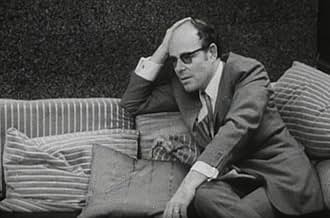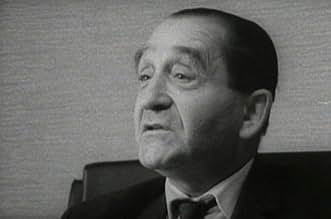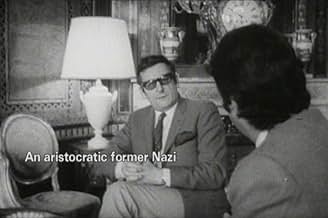Aggiungi una trama nella tua linguaAn in-depth exploration of the various reactions by the French people to the Vichy government's acceptance of the German invasion.An in-depth exploration of the various reactions by the French people to the Vichy government's acceptance of the German invasion.An in-depth exploration of the various reactions by the French people to the Vichy government's acceptance of the German invasion.
- Regia
- Sceneggiatura
- Star
- Candidato a 1 Oscar
- 6 vittorie e 2 candidature totali
- Self, former Wehrmacht Captain
- (as Helmuth Tausend)
- Self, general in the Wehrmacht
- (filmato d'archivio)
- (as General Stummel)
- Self, SS commander
- (filmato d'archivio)
- (as Zepp Dietrich)
- Self
- (filmato d'archivio)
- Self
- (filmato d'archivio)
- self, Former Mayor Of Combronde
- (as Monsieur Leiris)
- Self
- (filmato d'archivio)
Recensioni in evidenza
Thirty years down the road, Ophüls' methodology is as interesting as the history he tells. Merely claiming that Ophüls had an argument seems to work against the surface of his film, for he disguises his point of view, his argument, behind the reminiscing of his interview subjects. The film is a classic of humanist culture in large part because Ophüls, in giving the people the chance to say their piece, apparently puts his faith in those people (and in the audience that watches them) to impart "truth." However, the filmmaker is much cannier than this; he is not artless. The editing of the various perspectives in the movie allows the viewer to form conclusions of their own that don't always match those of the people who are doing the talking in the film. In fact, The Sorrow and the Pity makes great demands on the viewer, not just because of the film's length: Ophüls assumes you are processing the information he's providing, and so the film gets better as it progresses, with the viewer's attention being rewarded in direct correlation with the effort you put in.
And Ophüls is himself the primary interviewer in the film; you don't often actually see him, but he's there, asking the questions, leading on his subjects and his audience, only partly hidden (visually and philosophically) from view. The movie might look easy; there are none of the showy flourishes of a Kubrick or Stone here (or of Max Ophüls, for that matter). But the viewer is advised to remember that Ophüls' guiding hand is always in the background, constructing the film's version of the truth just as the characters do in their stories.
I concur with most of the comments from the other users. Certainly Ophuls' directorial hand is evident throughout, the editing, cutting, juxtaposition, reaction shots etc are all part of the construction of his argument, although his interviewees are obviously allowed to account for themselves at some length.
What I found most surprising was the amount of humour in the film. Because of Woody Allen's use of it in "Annie Hall" I thought it would be gruelling, but there were a number of laugh out loud moments, starting with the resistance leader whose main stated reason for fighting the Germans was that they were monopolising the best meat.
Emmanuel d'Astier de la Vigerie was also a total star. His comment about the sociological make-up of the Resistance - essentially misfits and malcontents, people with nothing to lose - was very telling. A number of other interviewees made similar points - the main collaborators were the bourgeoisie - the resistance was mainly based on workers, peasants, communists, youth and weirdos of various sorts. Compare that with the sitation in the '60s when the film was made and with the situation now in the western democracies.
Anthony Eden was another major surprise. The popular image of him now is of a buffoon, the man who screwed up Suez, but in the extended interview here he displays immense charisma, intelligence and humanity. And if they make a film of his life Jeremy Irons is a shoo-in for the role.
The Nazis, meanwhile, are clearly cut from the same cloth as the neo-fascists presently enjoying something of a resurgence in most of Europe. All the same arguments made in exactly the same way by the same sort of people. This (plus the smugness of the former Wehrmacht officer still wearing his medals) was probably the most chilling thing about the film.
The final obvious resonance is with Iraq. From the German soldiers baffled and outraged by the fact that some French were trying to kill them, to the French establishment referring to the Resistance as terrorists, (yes that was the exact word they used), to the initial acceptance of the Occupation turning to hatred as reprisals against the Resistance grew, many testimonies throw a radically new light on the present situation. To draw direct parallels would be a mistake - even the Gaullists were not as reactionary as Zarqawi or Muqtada al Sadr - but nonetheless there is a lot to learn from then about now, and about the difference between how events are perceived at the time and by History.
Another user comment complains about the amount of politics in the film. It's true that some knowledge is presupposed and the film would obviously mean more to those who lived through those times. However Ophuls has said that one of his main motivations was to show that the idea that you can divorce politics from everyday life is exactly what made collaboration possible.
These are just a few of the thoughts provoked by the film, which holds many more insights and surprises and I am sure repays as many viewings as Alvy Singer gave it. It's perhaps not as shocking or affecting as "Shoah" (on which it's surely the strongest influence) but then it's a different story. It shows us the best of humanity as well as the worst and neither are always where you might expect to find them.
Incidentally, it looks like the reportedly poor quality of the DVD may be down to the original film stock rather than the transfer.
Lo sapevi?
- QuizOriginally intended for French television. However, French broadcasters refused to show it arguing the documentary depicted occupied France as exclusively populated by traitors.
- Citazioni
Dr. Claude Levy: France is the only government in all Europe whose government collaborated. Others signed an armistice or surrendered, but France was the only country to have collaborated and voted laws which were even more racist than the Nuremberg laws, as the French racist criteria were even more demanding than the German racist criteria. It's not something to be proud of.
- ConnessioniFeatured in Io e Annie (1977)
- Colonne sonoreÇa Fait d'Excellents Français
Music by Georges Van Parys
Lyrics by Jean Boyer
Performed by Maurice Chevalier
I più visti
- How long is The Sorrow and the Pity?Powered by Alexa
Dettagli
- Data di uscita
- Paesi di origine
- Sito ufficiale
- Lingua
- Celebre anche come
- The Sorrow and the Pity
- Luoghi delle riprese
- Clermont-Ferrand, Puy-de-Dôme, Francia(Main location)
- Aziende produttrici
- Vedi altri crediti dell’azienda su IMDbPro
Botteghino
- Lordo Stati Uniti e Canada
- 13.082 USD
- Fine settimana di apertura Stati Uniti e Canada
- 5224 USD
- 26 feb 2023
- Lordo in tutto il mondo
- 13.082 USD
- Tempo di esecuzione4 ore 11 minuti
- Colore
- Mix di suoni



























